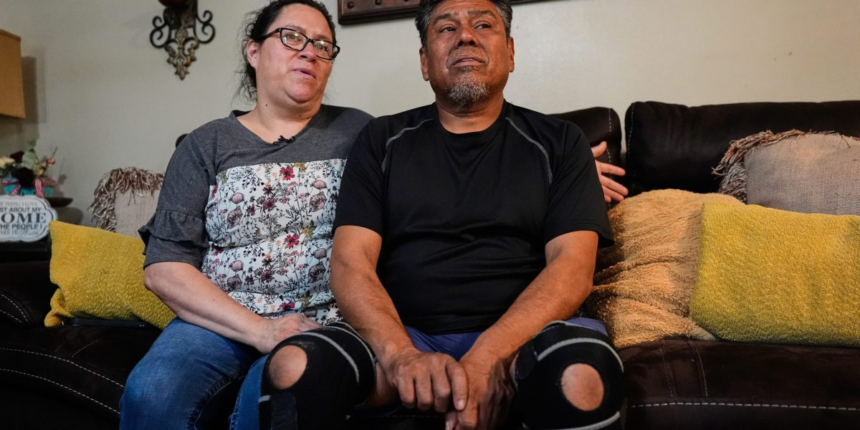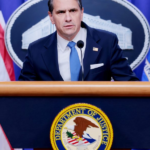“It worries me sometimes, because if you’re not healthy, then you’re not here for your kids,” Monreal said. “It’s a difficult decision, because, OK, do I spend $500 on a doctor’s visit or do I buy groceries?”
The enhanced premium tax credits set to expire this year have made costs far more manageable for many of them, allowing some lower-income enrollees to get health care with no premiums and higher earners to pay no more than 8.5% of their income.
If the tax credits expire, annual out-of-pocket premiums are estimated to increase by 114% — an average of $1,016 — next year, according to the KFF analysis.
As a result, especially hard-hit groups will include a small number of higher earners who’ll have to pay a lot more without the extra subsidies and a large number of lower earners who’ll have to pay a small amount more, said Cynthia Cox, a vice president and director of the ACA program at KFF.
With higher premiums, some people will drop out of health insurance altogether, Cox said. When many younger, healthier people inevitably forgo coverage, insurance companies will increase costs for members of the covered population to account for them being older and sicker.
The change may also strain hospitals, since more uninsured people will need emergency care they can’t afford. That could lead to hospital closures or cost increases.
“If you have less subsidies for people getting health insurance, you’re going to have less health coverage and less health care,” said Jason Levitis, a senior fellow in the health policy division at the Urban Institute. “People are going to be sicker and die more.”
Erin Jackson-Hill has allergies, asthma and searing hip pain she’s managing with prescribed medications until she can get a hip replacement. But even with all those conditions, the 56-year-old in Anchorage, Alaska, doesn’t think she can pay for health insurance next year if the ACA subsidies aren’t extended.
The executive director of two nonprofits, who also cares for her 89-year-old father full time, already pays nearly $500 a month for her premiums. If the subsidies disappear, she plans to forgo health insurance and pay for her asthma and allergy medications out of pocket.
Jackson-Hill said she worries about what will happen if her hip worsens and she can’t make it up the stairs in her father’s two-story home without treatment.
“I will have to go to the emergency room, or I’ll have to go bankrupt in order to pay for it,” she said.
Another ACA enrollee, Salt Lake City freelance filmmaker and adjunct professor Stan Clawson, said he’ll find a way to pay for health insurance next year — even if it means he must buy cheaper groceries or get a new job that provides it.
Clawson, 49, has lived with paralysis below his abdomen since falling while rock climbing when he was 20. He’s active and generally healthy, but his spinal cord injury has resulted in tendonitis in his shoulders and frequent urinary tract infections.
He also has to buy catheters to use every time he urinates — a cost he said would add up to around $1,400 a month without insurance.
“I don’t think a lot of people realize how expensive it is to have a disability,” Clawson said, adding that trying to live without health insurance would be “financially devastating.”
Chrissy Meehan, a hair stylist in Upper Chichester, Pennsylvania, has a neck condition that may require surgery. She says if ACA subsidies expire, she’ll further delay the procedure.
The 51-year-old voted for Republican Donald Trump for president last year, something she said she’s almost embarrassed about now that the Republican-led government hasn’t renewed the subsidies that help her afford her coverage through the state marketplace.
“I work hard, and I’m trying to survive and do it the right way and pay my way,” Meehan said. “I don’t want free. I just want affordable for my income.”
There are also concerns the delay will cause chaos, confusion and stress for Americans, some of whom have already started receiving notices that their premiums will skyrocket next year.
“Once those people say, ’Oh, wait, forget it, I’m out,’ it’s going to be hard to get a lot of them back,” said the Urban Institute’s Levitis.
Monreal’s husband will likely need both knees replaced, which will force him to take time off his job filling concrete. On their already tight $45,000 joint annual income, budgeting for themselves and their five children will become that much harder.
The concern over their budget and the uncertainty over their health care coverage send her thoughts into yet another worrisome spiral with just two weeks until open enrollment begins.
“They haven’t told us nothing,” she said of her insurance provider. “And you know what? At the end, you end up with no health care.”
___
Swenson reported from New York. Associated Press video journalist Tassanee Vejpongsa contributed to this report.









